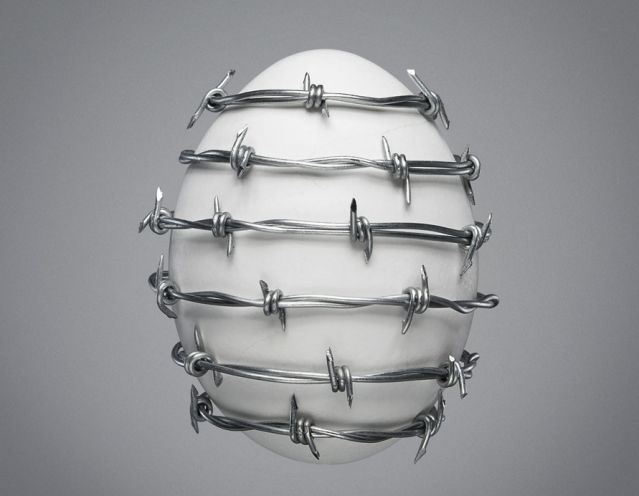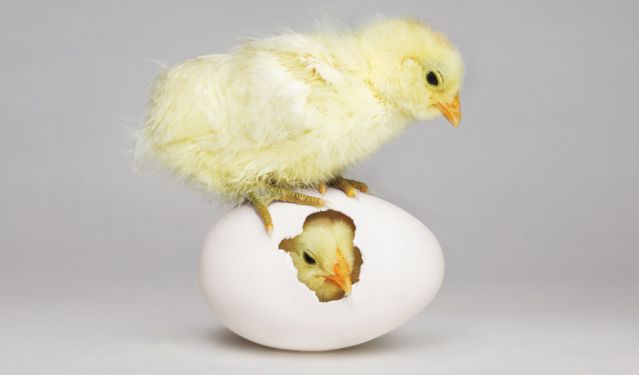Why Siblings Sever Ties
Sibling estrangement is a largely hidden phenomenon. Why do some brothers and sisters stand by each other no matter what, while others cut the cord?
By Sara Eckel published March 9, 2015 - last reviewed on June 9, 2016
Hope Rising used to dread holiday dinners with her family. Her older sister made each meal miserable, with snide comments about nearly everything Rising said or did. If she brought a new boyfriend, her sister would wonder aloud, “How long is this one going to last?” If Rising mentioned she had gone out dancing with friends, her sister would comment on how frequently Rising left her kids at home to party. Once, when her father asked to take a picture of his two daughters together, the sister refused and walked out of the room.
“She wouldn’t even give my father the picture he wanted,” Rising says.
After one particularly insult-laden meal, Rising’s father asked her sister to apologize or leave. She left, husband and kids in tow.
That’s when Rising decided the relationship was over: “I looked at my father and said, ‘Dad, I can’t do this anymore.’”
It took 14 years, and a fatal cancer diagnosis, for the sisters to speak again.

Blood Enemies
In the history of many families, there comes a time when napkins get thrown down on plates and a decision is made—whether silently or very loudly—that someone is done. Sometimes it’s brought on by childhood dynamics that have metastasized into toxic resentment. Sometimes there is no drama, just a dawning awareness that you have never particularly liked the person passing the mashed potatoes and so there is no reason to keep making an annual trek halfway across the country to see him or her.
The number of Americans who are completely estranged from a sibling is relatively small—probably less than 5 percent, says Karl Pillemer, Cornell University professor of human development and gerontology. The rest of us report mostly positive or neutral feelings about our siblings, but that can mean different things. For example, only 26 percent of 18- to-65-year-olds responding to an Oakland University survey reported having a highly supportive sibling relationship with frequent contact and low competitiveness, while 19 percent had an apathetic relationship, and 16 percent a hostile one. The rest said their siblings were friendly and supportive, which could still encompass limited contact or high competitiveness.
University of Pittsburgh psychologist Daniel Shaw, who studies sibling relationships in children, admits that in-depth research on adult sibling relationships is scarce, so we probably don’t have the full story yet, at least in part because for many families, “it’s too messy. Frankly, it’s easier to pretend the break just doesn’t exist.”
But Shaw knows that the sting can run deep. When he appeared on radio talk shows to discuss a paper on sibling relationships in childhood, he was surprised to get many calls from adults eager to talk to someone about the pain of their estrangement from brothers or sisters. “It definitely struck a chord,” he says. “Something happened and they never forgave each other, and so now they were calling in, as adults, to this radio show to talk about how they had decided to forgive, or how they hadn’t spoken for 20 or 30 years.”
A Widely Ignored Loss
Friction between adult siblings has traditionally not been of great interest to clinicians, or the culture at large, which can make matters that much more difficult for people struggling with a brother’s or sister’s antics, says Jeanne Safer, a New York City psychotherapist and the author of Cain’s Legacy: Liberating Siblings from a Lifetime of Rage, Shame, Secrecy and Regret.
Societal changes have had an impact as well: As Americans have shifted from extended family units to nuclear family units, sibling relationships have been overshadowed by those between parents and children, or between spouses, says New York University sociologist Dalton Conley.
Without a cultural mandate to stick together or a therapeutic road map to reconciliation, many siblings in strained relationships see no reason to continue. Psychologist Joshua Coleman, cochair of the Council on Contemporary Families, says that parents and grown children feel a strong moral imperative to stay in touch, even if the relationship is difficult. “But for siblings the ties are weaker, so there is less tolerance,” he says. “‘You were disrespectful to me, so screw you.’”
That’s the attitude Lachlan Atcliffe now takes. Nearly three years ago, the British commercial-property solicitor arranged to stay with his younger brother while looking for an apartment in London. As Atcliffe entered the flat, his brother’s first words were, “I want you out of here in three days.”
For the next two weeks, Atcliffe was subject to his brother’s constant rage, the result of a long-festering childhood grudge he never knew existed. “It was a massive shock,” he says.
Atcliffe has not spoken to his brother since.

Hey, How’s Your Brother Doing?
Since few people today see sibling bonds as a central aspect of adult life, it’s often easy for someone estranged from a brother or sister to cover the disconnect by citing geographical distance: “My brother lives in Phoenix, so I just don’t see him much.”
Yet because sibling relationships don’t carry the same weight as those with parents, they are simpler for most people to maintain—which actually makes it trickier to explain an estrangement. Tell someone you have a difficult relationship with a parent, and you’ll almost always get a sympathetic smile. Reveal that you’re divorced, and no one blinks. But what do you do when someone asks, “How’s your brother doing?” and you have no idea?
Laura McDonald, a personal trainer in New York City, used to lie. “I’d say, ‘Oh, he’s great, blah blah blah.’” In reality, their relationship ended three years ago, after she checked her phone in an airport and found this message from her brother: “Hey, if you haven’t left yet, I hope your f---ing plane crashes.”
Although in some ways the total break has been a relief—McDonald had been dealing with her brother’s hostility for decades—she also grieves that it had to come to that. “It’s like a dirty secret,” she says. “It’s shameful to tell people who ask, ‘Why can’t you get along? What’s the big deal?’”
How Rivalry Turns to Strife
As kids, brothers and sisters fight. It’s a fact of family life. They get angry with each other for stealing toys, borrowing sweaters, or crossing invisible boundaries in the back seat of the car. University of Illinois psychologist Laurie Kramer has studied 3-to-9-year-old sibling pairs and found that they experienced an extended conflict 2.5 times per 45-minute play session—once every 18 minutes. That sounds high, but in healthy sibling relationships, there are also a lot of positive interactions.
“Because there is so much more positivity happening,” Kramer says, “siblings can tolerate some negativity in their relationship, and we know that the ability to fight with your sibling and then resolve those conflicts can be an important developmental achievement.”
The siblings who never learn to manage these conflicts are most at risk for adult estrangement, according to Katherine Conger, director of the Family Research Group at the University of California, Davis: “You have no incentive to try to remain in contact. You just want to stay away from it.”
The role of family can play a big part in siblings’ ability to handle conflict—if Mom and Dad aren’t capable of managing their own disputes, they can’t model conflict resolution for their kids. But Coleman stresses that parents are not always to blame—sometimes there is just a personality clash. Psychologists now know, he says, that there is a genetic component to resilience—some kids are “dandelions” who can manage nearly any sort of strife, while others are “orchids” who wilt unless treated with the utmost care.
We all have different levels of tolerance and sensitivity, so it’s difficult to assign a specific personality type to those who cut a sibling off; it can be a sign of great self-respect or extreme sensitivity, depending on one’s interpretation of the situation: Was the “problem” sibling being truly hostile, or is the estranger someone who too quickly takes offense even when none is intended?
On the flip side, tolerating a fraught sibling relationship could also indicate a particularly strong or weak resolve. “Someone who is overly guilt-ridden and doesn’t have strong self-esteem might also give a pass to a sibling who has cost that person a lot psychologically,” Coleman says. “On the other hand, someone who is really healthy might be more compassionate and able to view the sibling from a sufficiently detached position.”

But Safer contends that there are two personality types who do appear particularly prone to being estranged by siblings—those who are extremely hostile and those she calls grievance collectors. “These are the ones who say, ‘You never thanked me for the flowers I gave you in 1982.’ That wears very thin on people.”
Amy Day has encountered both traits. She can recall childhood moments when her sister, who is 10 years older, would take her out for ice cream or just hang out. But her sister’s primary attitude toward her, then and now, remains deep-seated resentment. The youngest of six, Amy was the late-in-life child who unseated her sister as the baby of the family. Since then, Day feels, her sister has resented every positive event in her life—vacations, singing and acting performances, even her decision to take Buddhist vows.
The sight of birthday greetings on Day’s Facebook page sent her sister into a rage. “She put up a rant on my wall asking why people are calling me a friend,” Day says, “and why they are they being nice to me. Because if only they knew the truth about me and what a horrible person I am to her, they wouldn’t like me.”
Day subsequently unfriended her sister.
Most Favored Child
Amy Day and Hope Rising both say that their sisters saw themselves as less-favored children. Day notes that her household, which included an alcoholic older brother and a schizophrenic sister who later committed suicide, was chaotic, and that her mother saw Amy, her youngest, as a fresh start: “I was going to be the kid who didn’t disappoint her,” she says.
Between two-thirds and three-quarters of mothers have a favorite child, according to Pillemer’s research. When the level of favoritism is high, or is interpreted as such, siblings are more likely to become estranged. “It seems to be something people don’t quite get over,” he says.
But favoritism itself doesn’t necessarily drive siblings apart. Many adults can and do shrug off perceived less-favored-child status, while others let it fester. The difference, Coleman believes, is how the grown siblings feel about their adult lives. Those who have successful careers and fulfilling personal lives are less likely to fixate on the past—and might even derive some satisfaction from proving childhood detractors wrong.
“If the sibling remains in the one-down position, the relationship can be more painful because there is nothing to counter it,” Coleman says. “But if they are more successful, there’s that much more psychic ammunition” for the sibling to bounce back with confidence and establish a stronger connection.

When the Tinderbox Ignites
Things can become fraught, to the surprise of some adult siblings, when parents start aging and issues like long-term care or the settling of an estate are added to the mix. Many siblings who don’t get along may have avoided contact fairly easily for years but when suddenly forced to deal with each other and their parents or extended family in a stressful situation, a cold war can escalate into open conflict.
A Florida author, who asked not to be named, says she had never had a great relationship with her older sister—they just didn’t have much in common. But while the author was caring for their dying mother in her own home, her sister drained their mother’s bank account and emptied her house of valuables.
It was one of the most painful episodes of her life. “The level of betrayal was overwhelming,” she says. “I don’t think anyone is ever prepared for it. I certainly wasn’t.” The two haven’t had contact for four decades.
The Sibling From Another Planet
Not all sibling estrangement involves arguments, theft, or even petty sniping. Apathy can be just as devastating and befuddling as siblings come to realize that they’re just different people with little in common, and little reason for connection.
And then there is the moment when you come across a news report or joke that you instinctually want to share. “Then it’s just...sigh,” says Christine Parizo. She cut off contact with her brother after he told her he couldn’t get off work to fly from California to Massachusetts for her daughter’s baptism, and she discovered he’d spent the weekend in Las Vegas instead. “I pretty much flipped out and said, ‘I’m not dealing with you anymore.’”
As is often the case with sisters, Parizo had done nearly all the emotional work of maintaining their relationship—her brother was happy to answer the phone when she called, but rarely initiated contact. Two years after the Las Vegas episode, though, Parizo agreed to meet her brother for breakfast, at her parents’ urging, while she was in California on business. That’s when he explained for the first time that her daughter’s baptism had happened during a period of personal turmoil, the final stages of his divorce. “I had no idea what he had been going through,” she says. “He genuinely felt bad about it.”
After that, Parizo’s brother started making an effort, texting and connecting via Instagram and Facebook. But more important, she says, was being able to reclaim their shared history. “It’s nice to be able to share memories with someone who has the same perspective.”
This is one reason, Kramer notes, that even siblings in contentious relationships still feel pulled to one another. “It’s the fact that there is another person who knows how your mother gets when she’s packing for a trip or when the car breaks down,” she says. “That shared set of experiences and that shared understanding are very powerful.”
Not surprisingly, a primary reason feuding siblings remain in contact at all is to placate parents. “Parents lobby for this like crazy,” Safer says. “On their deathbed they push for it.”
But while parental intervention can have a positive influence, as it did for Parizo, a mother’s or father’s pleas can also deepen the pain. Atcliffe, the London solicitor whose brother raged at him, says his parents’ reaction compounded his shock: “They were relentless in their insistence that nothing happened and that I must have been exaggerating. I wasn’t able to tell someone about it until I could talk to a professional who would listen and not tell me to shut up.”
Who Stays? Who Doesn’t?
It may be hard to convince those who cut off contact with siblings, but for many, family is family, no matter how bad it gets.
Cathy Robbins is currently the only member of her family still speaking to her troubled brother, which has posed a challenge since he recently went missing and was found in a Montana hospital with a number of medical problems related to alcoholism. Robbins now tries to arrange his medical care from her California home. This is the same brother against whom Robbins once took out a restraining order and who threw her down a flight of stairs when they were teens. Why has she stuck by him?
“I don’t want to get the phone call from some coroner’s office that says, ‘We have a body here, and I have a phone number for you.’ That is a phone call I’m always dreading,” she says. “He is not a bad person. He just made some really bad choices.”
The difference between who stays in troubled sibling relationships and who breaks away may be at least partly based on cultural background and socioeconomic status. Research by University of Pennsylvania sociologist Annette Lareau has found that working-class and poor families have stronger kinship ties than their middle-class counterparts. And Safer notes that people from more traditional immigrant cultures are often under more pressure to maintain sibling ties, as that is seen as an extension of honoring their parents.
The impulse to stick with family is ingrained—like other mammals, we naturally favor those with whom we share the most genes, says Frank Sulloway, professor of psychology at the University of California, Berkeley. Some siblings strengthen their bonds by swapping altruistic actions toward each other, engaging in tit-for-tat relationships that build cooperation—you help your sister move; she watches your dog while you’re on vacation.
From an evolutionary perspective, though, siblings are also hardwired to engage in rivalry because they compete with each other for one of life’s most critical resources—parental care. For most of human history, this was not just academic, or about who gets Mom’s jewelry. “Two hundred years ago, half of all children did not make it out of childhood,” Sulloway says. “So the intensity of sibling competition makes much more sense when you realize that very small differences in parental favoritism could determine whether a child is taken to a doctor or not.”
Beyond such factors, Coleman believes, decisions about maintaining contact boil down to personal temperament. “Some people stay in contact when no one would have a hard time understanding why they would end a relationship,” he says, “where others cut off a sibling for relatively trivial offenses.”
Completely cutting off a sibling, regardless of how much it may be objectively deserved, still has serious emotional ramifications, Safer says. Those who initiate estrangement often feel deep regret later in life. “A sibling is usually the last member of your family who’s alive. We have our parents for 30 to 50 years, but we have siblings for 50 to 80 years,” she says. “This is the only person who remembers your childhood, and you have nothing to say to them? It’s tragic.”
Nevertheless, for some people, maintaining a connection simply isn’t possible. “It’s not always fixable,” Safer says, “but what is fixable is what you can work through in yourself.”
This was the conclusion McDonald reached. Her brother’s text wishing a plane crash on her was deeply disturbing, but once she accepted that the relationship truly was over, she could stop tiptoeing around her brother and begin to heal. “That was a pivotal moment,” she says. “How many times can you keep touching a hot stove and burning yourself?”
With her brother out of her life, McDonald says, she could work through her feelings of grief over their relationship’s end. Last year, she wrote a blog post about her estrangement and immediately started getting responses from others in similar straits around the world. “I got the most gut-wrenching, honest, raw responses from people. It was sort of surprising to me,” she says. “There are a lot of other people who have the same problem and it’s hurting them and they don’t know where to go or whom to talk to. It’s really almost an epidemic.”
That blog post enabled McDonald to connect with other people going though the same thing and help them move forward. Yoga, meditation, and therapy have also helped her, she says. “Life is too short to carry that anger, so I just sort of let it go.”
For Day, opting out of the mutual blame game was the key to her own self-healing, even as her relationship with her sister remains fraught. “I realized I’m not any better than she is if I let my resentment for her destroy me,” she says. The emotional distance she’s achieved has also enabled her to get a fresh look at how her sister’s resentment may have held her back. “I think if I ever got into a long-term relationship or got married, it would destroy her,” she says, “and I think there is some part of me that has resisted doing so for just that reason.”

Reconciliation
They don’t all hold high hopes, but everyone interviewed here says they would be willing to reconcile—if their sibling came forward with an apology and a willingness to start fresh. Hope Rising actually experienced that, though it took a tragedy for it to come to pass.
Last year, her sister was diagnosed with a rare, terminal form of cancer and given less than a year to live. Rising flew to Denver to see her. “Nobody told her I was coming,” she says, “but when I walked into my parents’ house, she was actually happy to see me.” Her sister even apologized for having treated her so poorly, assuring her she had never done anything wrong.
The two sisters now talk on the phone about once a week, but the connection is bittersweet. “I’m glad she had a change of heart,” Rising says, “but I’m sorry for the circumstances, because she has less than a year to live and all those years were wasted.”
Sibling Talk: Starting the Conversation

In many ways, troubling sibling issues are harder to resolve than difficult parent-child relationships because in the latter case, the rules are fairly clear, Coleman says—parents are expected to take the high road. “With siblings, it’s messier because there aren’t the same rules of engagement. It’s not your fault you’re Mom’s favorite,” he says.
Here are some ways to move toward reconciliation:
- Start softly. Don’t roll out a laundry list of grievances. Tell your sister that you understand she’s very busy with her family before asking for help with your mother’s care. “The more calmly you raise a topic, the more productive it will be,” Coleman says.
- Hold the judgment. Your long-married brother might not realize his jokes about your scattered dating life are hurtful, so explain how they make you feel, without judgment. “If your goal is to see if a different kind of relationship is possible, then you want to give them the benefit of the doubt,” Coleman says. “They may not know their behavior has been hurtful.”
- Stay in the present. “Not everyone is interested in conversations that dredge up the past or in having a lot of psychological talk,” Coleman says. Rather than listing all the times your sister has bossed you around and taken over family events since you were 5, simply explain that you plan to prepare Thanksgiving dinner your way in your home and that you hope she’ll join you and your parents.
- Check your ego. Understand that a truly honest conversation about the bumps in your relationship must necessarily involve your bad behavior, too. “You have to be prepared to hear some very unflattering things about yourself,” Safer says.
- Manage expectations. A lifetime of resentment won’t disappear after a few conversations. Focus on incremental progress and honor the small victories. “Don’t expect that either one of you is going to get a personality transplant even if you kiss and make up,” Safer says. “It is a huge achievement if you no longer dread being together.”
